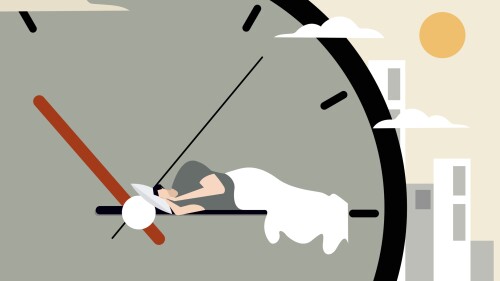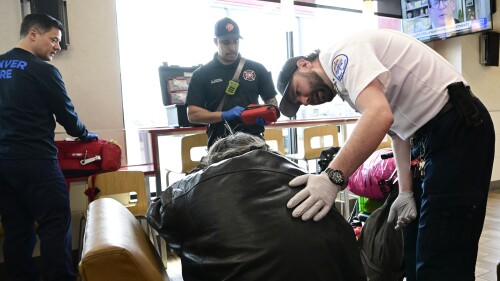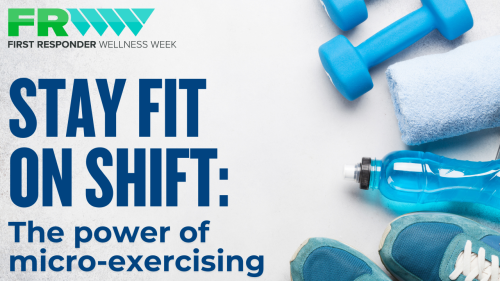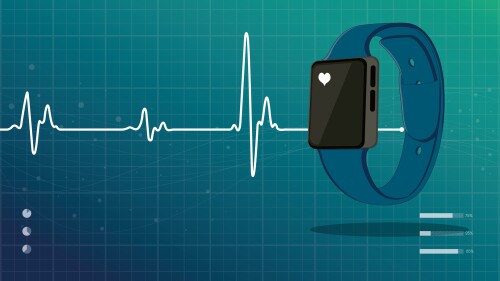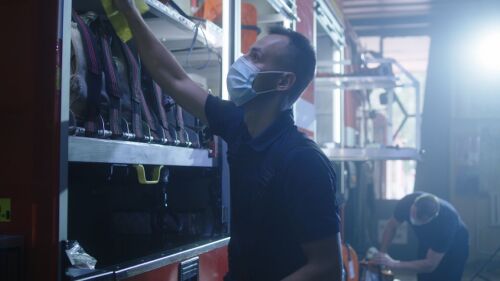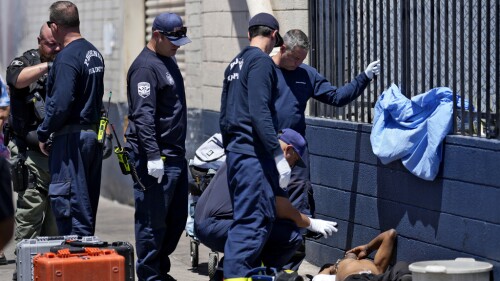Strategies to elevate paramedic safety, wellness, career development and operations
The state of the industry EMS Trend Survey explores issues tied to provider recruitment and retention; safety, health and wellness support; technology adoption; and career development, produced in partnership with Fitch & Associates and the National EMS Management Association.
EMS TREND REPORT
Help us identify the factors impacting wellness, advancement and satisfaction in EMS
ANALYSIS AND COMMENTARY
Fitch & Associates and EMS1 break down trends in staffing, operations and career longevity
For first responders, good nutrition isn’t a luxury — it’s a performance tool. But cutting through trends and keeping it simple is the real key to long-term success
Leadership is about serving others, not feeding your ego
Leading through crisis without losing hope — the Stockdale Paradox in EMS
Building mental and physical resilience isn’t just important — it’s essential for EMS professionals. If your program isn’t gaining traction, these 5 roadblocks could be to blame.
Cold showers offer a powerful and accessible tool for medics to combat stress, boost resilience and cultivate mental clarity
Who could use a little more sleep?
Insufficient sleep impacts decision-making, wellness and risk-taking, putting providers and patients at risk
Transitioning to a healthcare system that embraces and reimburses community-based EMS care
Colorado Springs, Sacramento and Richmond: Integrating analytics into decision-making to enhance patient outcomes, personnel support and sustainable operations
Takeaways from the First CMS Data Collection Report on Ambulance Services to enhance service levels and reduce costs of service delivery
Community collaboration, harm reduction models and policy changes can ease the burden on EMS workers and improve patient outcomes
The EMS Leadership Academy highlights the urgent need to address funding, career pathways and wellness support
An explainer and action plan based on the Consensus Statement of NAEMSP, IAFF and IACP
What CoAEMSP has learned about EMS student attrition and retention
Wellness programs and sleep interventions can ease burnout and improve job satisfaction
Adapting to growth and changing demands with innovative community partnerships
Carly Strong, COO, SEMSA/Riggs Ambulance: “Take every opportunity’
Practice self-care and do the work on the front end so you have more to give on the back end
Highlighting a joint statement from EMS associations, Chief Brian Schaeffer argues for a shift towards broader, evidence-based performance metrics to enhance EMS quality and effectiveness
RECRUITMENT AND RETENTION
If you’ve ever worked tired, driven drowsy, or taken one shift too many, this one’s for you
With 17 paramedic vacancies, the county turns to sign-on bonuses, but will it solve the real problem?
City leaders seek millions in funding to improve EMS wages
Program aims to recruit and train 50-75 paramedics annually to strengthen workforce
State EMS Director Joe Schmider on how Texas’ data-driven plan brought in 10,915 new providers
Recruitment efforts can focus on non-traditional members, people who live outside the area and even members of neighboring departments
Eve Grau, co-founder of Royal Ambulance, a Glassdoor Employee’s Choice winner, shares the moments that matter, and how to recognize performance
From coffee, to healthy snacks and hydration options, make sure your EMS crews have everything they need to recharge between shifts with cost-saving subscription options
When the overtime pool is deep, many EMTs and paramedics will swim for as long as they possibly can
No one wants to join a sinking ship
“You can’t oversee EMS medicine from behind a desk.” With a full-time medical director, providers gain a mentor, coach and advocate.
When leadership turnover is persistent, is this a personnel issue or a deeper systemic problem?
Understanding the Employee Value Proposition is the key to attracting, engaging and retaining good people for your EMS organization
If we want to keep up, it’s time we change gears and evolve from a traditional recruitment strategy
Upcoming changes to TPS and DACA programs could impact EMS professionals across the U.S.
Through a partnership with the Girl Scouts of America, Camp Fury is igniting a passion for public safety and emergency services among young girls
Stay interviews help employees feel valued, respected and supported, improving their engagement and motivation
Early career exposure can make or break future career choices; here’s how one agency is fostering school-age children’s interest in an emergency services career
Paramedic chiefs and EMS leaders need to set shift length based on call demand, available personnel, equipment supply and time on task
Six different career ladders with compensation and rank based on experience, higher education and specialized training improves retention
HEALTH AND WELLNESS
The habit? Working out with your dog in ways that support movement, recovery and routine
Learn how to choose the right pet for your shift schedule, energy level and emotional needs
MMR shares their journey to adopt a pet who provides unconditional support
A sober reminder that wellness isn’t just a buzzword — it’s a lifestyle
“Fatigue isn’t just about feeling tired. It’s a physiological and cognitive state that directly impacts decision-making, reaction times and the ability to perform under pressure.”
Eye movement desensitization and reprocessing focuses on reducing the vividness and emotion associated with the traumatic memories
Following up after a traumatic incident can make all the difference. These practical conversation starters help you show empathy and provide support without making it awkward.
Forget protein bars — the best “exercise snack” happens in the patrol car, between calls or while restocking the rig
Savor the victories and find humor in the routine to carry the emotional load
Save up to 40% off on Nest, Coleman, DEWALT, CRAFTSMAN, Contigo, Ninja, Cuisinart & more
Tired of aching feet? Check out these expert-backed solutions to keep you moving, stay pain-free and perform at your best
Learn the difference between the two, the effect on the human body, and how to protect your health during a storm
EMS providers are more susceptible to sleep disorders and their inherent dangers and health implications
Personal reactions to trauma take many forms, but some offer important clues that you may be experiencing PTSD
When free of shift schedules, try these tips to get to sleep faster and achieve quality sleep
How one fire department added a shift to improve its members’ work-life balance
Short on time and space? Check out these products to help get a workout in no matter where you are in your day
By incorporating these snacks into their daily routine, EMS providers can better manage their energy levels and focus
The COVID-19 RAPID Mental Health Assessment highlights key concerns related to first responder stress, general wellbeing, and work-life balance
“There has never been a more crucial time to have a wingmate in EMS – a wingmate to watch your six and guide each other through the storm”
LEADERSHIP
These sources of start-up and long-term funding can help launch and provide economic sustainability for mobile integrated health care
A unified effort among EMS agencies, hospitals and aviation units ensures faster, lifesaving treatment
Lee County EMS Division Chief Adam Thompson shares insights on Just Culture and the importance of investing in people to create a thriving workforce
With call volumes up 55%, Walla Walla shifts to local funding to add EMTs and paramedics
From jumping in the field to empowering crews in decision-making, Chief Nicholas Oleck fosters accountability and camaraderie in his department
Vague definitions and enforcement challenges raise concerns about how a new law will function in real-world emergencies, leaving providers to navigate gray areas under pressure
Know the newest fire- and EMS-related laws
Opportunities for OSHA’s proposed Emergency Response Standard to improve EMS safety
Alan Cowen, fire deputy chief (ret.) Los Angeles City Fire Department, reflects on leadership lessons
From avoiding critical errors to fostering trust, discover 5 actionable strategies to master active listening to deliver better care
Discover practical strategies for public safety leaders to stay grounded, manage stress and inspire their teams during life’s toughest challenges
Here are books for grant writers looking to hone their craft
Assistant Chief Joel Koehn on servant leadership, empowering his team and focusing on organizational culture
Colorado’s community naloxone distribution program faces a financial shortfall as state funding dwindles, raising concerns for overdose prevention efforts
These are challenging times to be a first responder; your support is welcome and appreciated
Communicating with law enforcement and following these clinical guidelines will help to keep patient safety first and foremost
It is time for an honest conversation about response times, reimbursement and funding solutions for the future of EMS
Navigating the shift in financial responsibility and the impact rural EMS practices and policies
It’s a two-way street; HR professionals should do more to understand the industry and fire/EMS leaders should better explain the needs of members
Ambulance services cannot afford to feed the billing department incomplete, inaccurate or misrepresented information
Retired firefighters, EMS and police officers may reduce their taxable earnings by up to $3,000 for medical insurance premiums paid during a calendar year
Laurie Thiel shares strategies for addressing unproductive meetings and boosting productivity in EMS workplaces
It’s hard to sit back and watch when so much work needs to be done, but your team needs stability, not more chaos
Chapter 4 of this comprehensive desk reference about EMS in the U.S. untangles the origin and history of the EMS Star of Life
ABOUT THE SPONSOR: PULSARA
The Pulsara platform empowers responders to triage and track patients while managing any incident – from mass casualty incidents to hurricane evacuations, MVAs with multiple patients or special events – and assist in evacuation and reunification efforts as the incident unfolds. Pulsara’s powerful scanning technology allows responders to instantly scan patient wristbands to create or join existing patient channels, making continuity of care and interoperability between organizations seamless. No matter who you need to connect with in a crisis, Pulsara can help connect you to the right resources at the right time.
How a state’s wristband system and Pulsara redefined safety at the Texas Renaissance Festival
Assistance is available from the U.S. government, but local systems have important responsibilities
Pioneering patient management and communication tools may be the answer to enhancing provider job satisfaction and combating EMS retention problems
Once you’ve determined what it will do, you face some more practical questions
It’s not as hard to get started as you might think – follow these initial steps



















